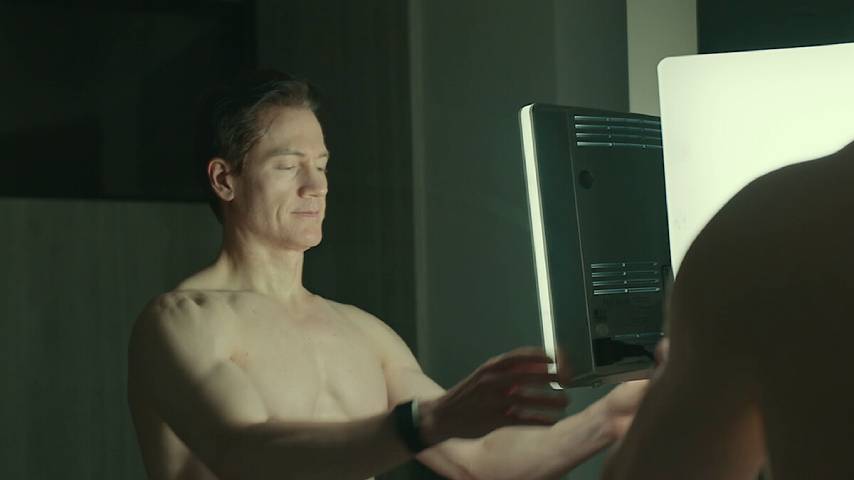Don't Die: The Man Who Wants To Live Forever Skims The Wrinkle-free Surface

Anyone who has ever navigated the thorny labyrinth of the American healthcare system (and many who haven’t) has likely wondered what it would be like to throw seemingly limitless resources and time at not only the diagnostic complications of illness, but also preventative self-care. Netflix documentary Don’t Die: The Man Who Wants To Live Forever answers that question, even if it falls flat in other ways.
Directed by Chris Smith, the film focuses on Bryan Johnson, a tech entrepreneur who has made it his life’s mission to target the pesky biology of aging. More amiable curio than hard-hitting social exploration, the result is entertaining if surface-skimming—a film whose shortcomings are not technical or creative, but rather more a function of framing and philosophical engagement.
As the founder and CEO of Braintree, Johnson made his money in mobile and web payment systems before selling his company to PayPal in 2013. Since then, he has practiced venture capital investment while seemingly devoting the overwhelming amount of his energy to, well, just living longer.
The vehicle for his singleminded obsession is a radical and highly disciplined personal anti-aging program which he has dubbed “Project Blueprint.” Its aim is to slow the pace by which Johnson gets older and, theoretically, perhaps even reverse most of the functional declines that go along with old age for everyone. With a vast, built-out infrastructure, this includes everything from diet, exercise, and hundreds of pills per day to more cutting-edge and experimental treatments.
While the first 15 minutes of Don’t Die: The Man Who Wants To Live Forever indulge a dizzying amount of wordy detail (why hello, inhaled lung senolytics and penis shockwave therapy!) in much the same way that businesspeople use a particular vernacular to make themselves sound smart, those fearing an advanced biology lesson needn’t fear. Don’t Die isn’t really a wonky exercise, and generally pivots away from a lot of the specific science of Johnson’s regimen.
Instead, the movie introduces Johnson’s teenage son, Talmage, who has reconnected with his father following a divorce. From there, it alights upon various aspects of both Blueprint and its subject’s life, including Johnson making public all of his health data, leveraging that open-book documentation for commercial purposes (“It’s not science, it’s just attention,” says one doctor dismissively), inter-generational plasma therapy, and more.
Smith first garnered attention with his 1996 debut, American Job, a sharp mockumentary that assayed the difficulties of minimum-wage life. But he really made a splash with the Sundance-minted 1999 indie hit American Movie, which cast a sympathetic eye on an eccentric would-be filmmaker from Wisconsin. Smith has gone on to have a varied career that, in recent years, has seen him following the money trail in the nonfiction realm, directing high-profile multi-episodic nonfiction projects for Netflix, Apple TV+ and Max.
Though Smith’s early efforts seemed to herald the arrival of a gifted, offbeat, and uniquely perceptive new chronicler of blue-collar struggles, much of his latter-day work (Fyre, Branson, Mr. McMahon) focuses instead on the lives and problems of (and, indeed, those often created by) the ultra-wealthy. In this respect, Don’t Die slots comfortably into Smith’s filmography.
While it lacks the crucial similarity of a criminal element, Don’t Die actually shares a good bit in common with Smith’s four-part Bad Vegan, which recounted the weird downfall of New York vegan restauranteur and aspiring influencer Sarma Melngailis. In a macro sense, both projects are stories of fundamentally unhappy and deeply ambivalent people casting about for someone or something to give their lives a larger purpose.
Whereas Bad Vegan never quite cracked the poised emotional aloofness of Melngailis, Don’t Die actually does an admirable job of completely humanizing Johnson. In a world where billionaires frequently present as clueless and socially broken, Johnson (a mere millionaire 400 times over) has a refreshing self-awareness. He talks openly of past mental health struggles and has a pleasant, self-effacing demeanor, even going so far as to admit in kidding/not kidding fashion, “This is a cult—to get you to go to bed earlier.”
But the movie remains, not unlike Bad Vegan, commingled parts captivating and frustrating. This is in large measure because Smith doesn’t seem to fully realize Don’t Die’s various supporting plotlines are actually the fuel driving Johnson’s quixotic quest. Co-editors Daniel Koehler and Paul Trewartha often find compelling points of contrast and commentary within specific scenes, but many story elements feel like they should have been pulled forward, to create a more holistic portrait. As packaged, Don’t Die feels like a collection of discrete songs instead of an album with a more cogent thematic throughline. For example, the participation of journalist Ashlee Vance (who also nets a producer credit) lands as half-sketched, not fully plumbing his expertise in the tech field in a way that could potentially help frame Johnson’s pursuit as part of a larger trend of rich men putting their massive wealth towards undertakings that read as toxic combinations of vanity project and unasked-for social terraforming.
Don’t Die also doesn’t confront aspects of its subject’s faulty worldview, instead accepting as gospel truth statements that sound reasonable on the surface merely because Johnson delivers them in a levelheaded tone and articulate manner. Johnson opines that, “As a species, we accept our inevitable decay, decline and death”—this despite the fact that entire industries, and trillions of dollars of economic spending, are devoted to denying aging, plus the immutable truth that humankind’s knowledge of and preoccupation with our own mortality probably drives as much latently self-destructive behavior as any other single factor.
A more ambitious film would recognize this material, foremost, as a story of familial estrangement and religious seeking, and more fully integrate these elements into its narrative DNA. For all its anti-aging trappings, Smith’s movie is most intriguing when detailing Johnson’s crippling depression at the height of his professional success, his decision to leave the Mormon church, his ongoing estrangement from two other children, and other personal stories. Talk of deprioritizing the “authority” of the mind in favor of the body also points to a raging inner storm in someone who takes for granted a baseline level of mental acuity. There’s a grander thesis here, but Smith doesn’t grab hold of it.
Despite this committed avoidance of a heavier thematic lift, Don’t Die: The Man Who Wants To Live Forever still works quite fine as a slice of diverting entertainment. Viewers wishing to merely gawk and peek behind the curtain of someone whose wealth and privilege abets their singular whims won’t come away feeling disappointed. Seeing Johnson process the emotions of preparing to drop off Talmage at college (complete with a trip to IKEA), and through his regimen eventually locating a sense of place and broader community that has long eluded him, one can’t help but feel a surge of compassion and, surprisingly, identification. If Don’t Die had a bit more of the discipline its subject imposes on his own days, those feelings might linger longer.
Director: Chris Smith
Release Date: January 1, 2025 (Netflix)


